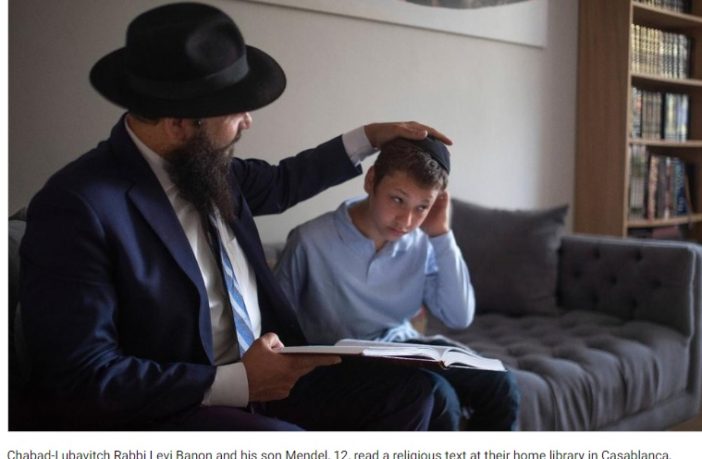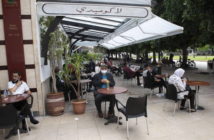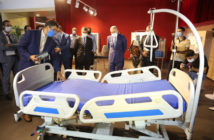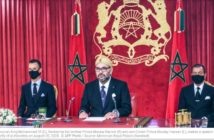By Associated Press, Wire Service Content
BY MARIAM FAM
When the phone rang on the second day of Passover, Chabad-Lubavitch Rabbi Levi Banon figured it must be an emergency.
Electronic devices were prohibited during the holiday. Any call must be urgent. It was.
Rabbi Sholom Eidelman, his godfather and a longtime Jewish leader in the Muslim country of Morocco, had died after contracting the coronavirus. It was the second virus death in as many days, Banon said. Once again, he left home to perform the funeral.
There have been many funerals as the new coronavirus –in its early days in Morocco–hit a Jewish community that is a shadow of what it once was numerically.
“There’s a lot of old people in the community,” said Banon. “That made it very alarming.”
Some days have brought news of more than one coronavirus-related death, he said. One funeral, broadcast over zoom, had two caskets–the deceased, unrelated in life, united in death, both struck down by the virus.
At one point Banon hosted two kids until their parents were released from the hospital. At another, he comforted a young man after his father died while his mother was hospitalized.
“We’ve been hit very badly because we’re a family and now we’re all working very, very hard to stay confined and to stay separate,” Banon said.
Serge Berdugo, head of the Council of the Jewish Communities of Morocco, said 12 community members died in the country between late March and late April after contracting the virus. That’s nearly six percent of the 206 coronavirus-related deaths that Morocco, a country of about 36 million, announced as of June 2.
Like many Muslim majority Arab countries with once-flourishing Jewish communities, the number of Jews in Morocco has dwindled. Roy Mittelman, director of the Jewish studies program at The City College of New York estimates it is about 1,500 today, mostly in the city of Casablanca. Berdugo put the figure at around 2,500.
Jewish presence in Morocco dates back at least two millennia, with a large wave of arrivals later as a result of the Spanish Inquisition, Mittelman said. The community numbered around 270,000 before the 1948 creation of Israel and waves of departures spurred by geopolitical tensions, Arab-Israeli wars and periods of uncertainty, he said.
In Casablanca, the community that remains is vibrant. The city boasts about 15 functioning synagogues and five kosher restaurants, said Berdugo, an ambassador at-large for Morocco’s king.
Officials and community leaders tout Jewish life in Morocco as a model for Jewish-Muslim co-existence and a testament to Morocco embracing a diverse heritage. They point to renovations of Jewish sites—which attract tourists and others— and a constitutional recognition since 2011 of “Hebraic” influences.
While “moments of tension” can be sparked by Middle East conflicts, they tend to blow over quickly, said Vanessa Paloma Elbaz, a University of Cambridge research associate who has also been collecting oral histories of Moroccan Jews.
In Rabat, David Toledano, president of Rabat’s Jewish community of about 100 people, said he lost a “close friend” and a “pillar of the community” in Rabat to the virus.
The man ran Rabat’s only kosher restaurant, performed Jewish burial rites and helped at the synagogue, often calling others to make sure they show up for services, he said.
“He loved to sing and he loved to lead,” he said. “The loss is heavy.”
Why the virus has pummeled the community early on is open to debate.
Berdugo said he believed infections started at a Jewish wedding in the south which had people coming from France. Days later, a Purim gathering at a Casablanca synagogue, attended by some guests from the wedding, likely helped spread the virus, he said. Purim, celebrated this past March, celebrates the saving of the Jews from a threatened massacre in ancient Persia.
Banon rejects theories that any one event could have spread infections.
At a different Purim celebration organized by Jeunesse Chabad of Morocco of which Banon is the director, revelers decked out in costumes for the occasion donned gloves as they danced, he said. Alcohol gels were given out and people stayed “more spread out than usual” in a “very spacious and very airy” tent, he said.
The gathering was held before Morocco announced later in March a health emergency, restricting movement across the country, and attracted about 400 to 500 people, Banon said. “We took all the precautions.”
The virus cast a grim pall over Passover.
Ordinarily, Toledano hosts young Americans, in Morocco to learn Arabic for the holiday. This year, he spent it alone with his wife. Like many in the community, his children left to study abroad and have since started new lives there.
In Casablanca, Rabbi Jacquy Sebag spent Passover at a hotel after he was released from a hospital where he was treated for the virus. In his solitude, he reflected. The bottom line, he said, is to understand that “only the almighty God is driving and leading His world,” and “to do the best we can do for others; it doesn’t matter Jewish or non-Jewish.”
Passover was on Rabbi Eidelman’s mind. He wanted to ensure that the holiday staple known as “shmurah matzah” was brought in time from France, Banon said.
Born in Soviet Russia, Eidelman had been in Morocco since 1958 as an emissary for Chabad-Lubavitch, an Orthodox Jewish Hasidic movement.
For his work mentoring and training others –from rabbis to rabbinical judges to kosher slaughterers–Eidelman became known among students as “the rabbi of rabbis,” Banon said.
“Chief rabbis of…different countries and rabbis of a lot of different communities around the world are his pupils,” he said. “He spent his time working and giving the credit to others.” There are three Lubavitch households in Morocco, Banon said, including his and Eidelman’s.
Amid the loss, Banon takes heart in the solidarity of the tight-knit community.
“We are grieving right now and we’re hoping for better days.”
___
Associated Press religion coverage receives support from the Lilly Endowment through the Religion News Foundation. The AP is solely responsible for this content.
___
Copyright 2020 The Associated Press. All rights reserved. This material may not be published, broadcast, rewritten or redistributed.







